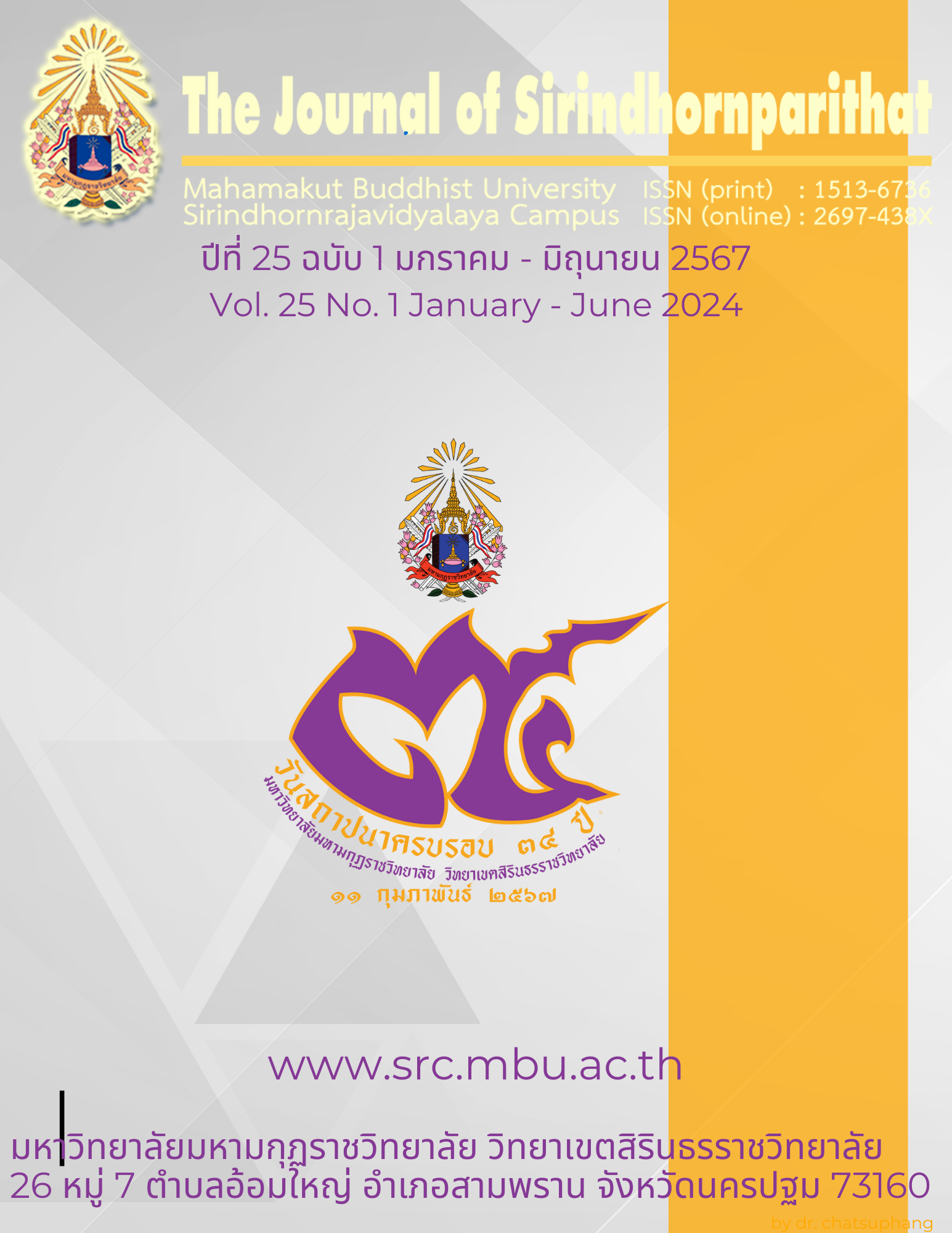Administration According to Good Governance and Administrative Processes Affecting the Effectiveness of Municipalities in Sampran District Nakhon Pathom Province
Keywords:
administration according to the principles of good governance, administrative processes, effectiveness of municipalitiesAbstract
The research purposes were: (1) to study the administration levels according to good governance and administrative processes of municipalities in Sampran District, Nakhon Pathom Province; (2) to study the administration according to good governance and administrative processes affecting the effectiveness of municipalities in Sampran District, Nakhon Pathom Province; (3) to present the guidelines for improving the effectiveness of municipalities in Sampran District Nakhon Pathom Province. This research was the quantitative and qualitative research. The target population was the people aged 18 years and over, and domiciled in the municipalities in Sampran District Nakhon Pathom Province. The sample group for quantitative research was the 400 people, and the research instrument was the questionnaire. The sample group for qualitative research was the 18 people, and the research instrument was the in-depth interview form. The data analysis statistics were the frequency, percentage, mean, standard deviation, multiple regression analysis, and correlation analysis.
The research findings were: (1) the administration according to good governance and administrative processes affecting the effectiveness of municipalities in Sampran District, Nakhon Pathom Province found the overall was at high level; the descending mean were: the responsiveness principle, the effectiveness principle, the transparency principle, the accountability principle, the equity principle, the efficiency principle, the rule of law principle, the morality/ethics principle, the participation principle, and the decentralization principle, respectively; (2) the administrative processes of municipalities in Sampran District, Nakhon Pathom Province found the overall was at high level; the descending mean were: the planning aspect, the ethics administration, the aspect of administration related to society, and the aspect of authority administration, respectively; (3) should be the planning for the authority administration to achieve the highest efficiency in the administration according to the principles of good governance.
References
จุฑามาศ ภูสง่า. (2560). การบริหารตามหลักธรรมาภิบาล โรงเรียนสังกัดสำนักงานเขตพื้นที่การศึกษามัธยมศึกษา เขต 24. วารสารสถาบันวิจัยพิมลธรรม, 4(1).
ไททัศน์ มาลา. (2561). การจัดการปกครองสาธารณะแนวใหม่ (New Public Governance: NPG) : แนวคิดและการประยุกต์ใช้ในการจัดการปกครองท้องถิ่น. วารสารวไลยอลงกรณ์ปริทัศน์ (มนุษยศาสตร์และสังคมศาสตร์), 8(1).
ปรัชญา คล้ายชุ่ม และคณะ. (2562). การบริหารตามหลักธรรมาภิบาลของผู้บริหารสถานศึกษาสังกัดสำนักงานเขตพื้นที่การศึกษา ประถมศึกษานครปฐม. วารสารศึกษาศาสตร์ มหาวิทยาลัยกรุงเทพธนบุรี, 7(2).
พิทยา บวรวัฒนา (2552). ทฤษฎีองค์การสาธารณะ. (พิมพ์ครั้งที่ 16). กรุงเทพมหานคร : คณะรัฐศาสตร์ จุฬาลงกรณ์มหาวิทยาลัย.
รัตน์ชนก พราหมณ์ศิริ และกฤษณ์ ภูรีพงษ์. (2560). หลักธรรมาภิบาลกับการพัฒนาคุณภาพและประสิทธิภาพการบริหารจัดการศึกษา ในมหาวิทยาลัยเอกชนพื้นที่ภาคเหนือ. วารสารวิชาการศึกษาศาสตร์, 18(2).
สำนักงานคณะกรรมการป้องกันและปราบปรามการทุจริตแห่งชาติ. (2560). แนวทางในการขับเคลื่อนหลักธรรมาภิบาลเพื่อสกัดการทุจริตเชิงนโยบาย. กรุงเทพมหานคร.
สำนักงานเลขาธิการสภาผู้แทนราษฎร. (2560). หลักธรรมาภิบาลในรัฐธรรมนูญแห่งราชอาณาจักรไทย พุทธศักราช 2560. สำนักงานเลขาธิการสภาผู้แทนราษฎร.
สุธิดา พัฒนศรีวิเชียร. (2560). ความสำคัญของธรรมาภิบาล ประชาธิปไตย การมีส่วนร่วมของประชาชน และสื่อในการพัฒนา. วารสารมหาวิทยาลัยพายัพ, 27(1).
สุมนา ยิ้มช้อย และคณะ. (2560). การบริหารงานตามหลักธรรมาภิบาลขององค์การบริหารส่วนตำบลวังแขม อำเภอคลองขลุง จังหวัดกำแพงเพชร. การประชุมสัมมนาวิชาการ ราชภัฏนครสวรรค์วิจัย ครั้งที่ 1.
อริย์ธัช แก้วเกาะสะบ้า . (2560). หลักธรรมาภิบาลในรัฐธรรมนูญแห่งราชอาณาจักรไทย พุทธศักราช 2560. บทความวิชาการ, สำนักงานเลขาธิการสภาผู้แทนราษฎร.
Bovaird, T., & Loffler, E. (2005a). Understanding Public Management and Governance in Public Management and Governance. Tony Bovaird and Elke Loffler (eds.). London: Taylor & Francis Group.
Certo, Samuel C. (2000). Modern Management. New Jersey: Prentice-Hall.
Cheema, G. S. (2005). From Public Administration to Governance: The Paradigm Shift in the Link between Government and Citizens. A paper presented at the 6th Global Forum on Reinventing Government towards Participatory and Transparent Governance on 24-27 May 2005, Seoul, Republic of Korea.
DuBrin, A. J. (2010). Principles of Leadership. (6th ed.). Mason, OH: South-Western Cengage Learning.
Kennett, P. (2010). Global Perspectives on Governance. In The New Public Governance?: Emerging Perspectives on the Theory and Practice of Public Governance. Stephen P. Osborne (ed.). London: Routledge.
Osborne, S. P. (2010a). Introduction: The (New) Public Governance: A Suitable Case for Treatment ?. In The New Public Governance ?: Emerging Perspectives on the Theory and Practice of Public Governance. Stephen P. Osborne (ed.). London: Routledge.
Pestoff, V. & Brandsen, T. (2010). Public Governance and the Third Sector: Opportunities for Co-production and Innovation?. In The New Public Governance?: Emerging Perspectives on the Theory and Practice of Public Governance. Osborne, S. P. (ed.). London: Routledge.
UNESCAP. (2004). Traders Manual for Least Developed Countries : Cambodia. United Nations. Economic and Social Commission for Asia and the Pacific.
United Nations Development Programme. (1997). Governance for Sustainable Human Development. A UNDP Policy Document.
World Bank. (1989). Sub-Saharan Africa: From Crisis to Sustainable Growth. Washington DC.: The World Bank.

Downloads
Published
Issue
Section
License
Copyright (c) 2024 Mahamakut Buddhist University

This work is licensed under a Creative Commons Attribution-NonCommercial-NoDerivatives 4.0 International License.
บทความที่ได้รับการตีพิมพ์เป็นลิขสิทธิ์ของ มหาวิทยาลัยมหามกุฏราชวิทยาลัย วิทยาเขตสิรินธรราชวิทยาลัย
ข้อความที่ปรากฏในบทความแต่ละเรื่องในวารสารวิชาการเล่มนี้เป็นความคิดเห็นส่วนตัวของผู้เขียนแต่ละท่านไม่เกี่ยวข้องกับหาวิทยาลัยมหามกุฏราชวิทยาลัย วิทยาเขตสิรินธรราชวิทยาลัย และคณาจารย์ท่านอื่นๆในมหาวิทยาลัยฯ แต่อย่างใด ความรับผิดชอบองค์ประกอบทั้งหมดของบทความแต่ละเรื่องเป็นของผู้เขียนแต่ละท่าน หากมีความผิดพลาดใดๆ ผู้เขียนแต่ละท่านจะรับผิดชอบบทความของตนเองแต่ผู้เดียว



